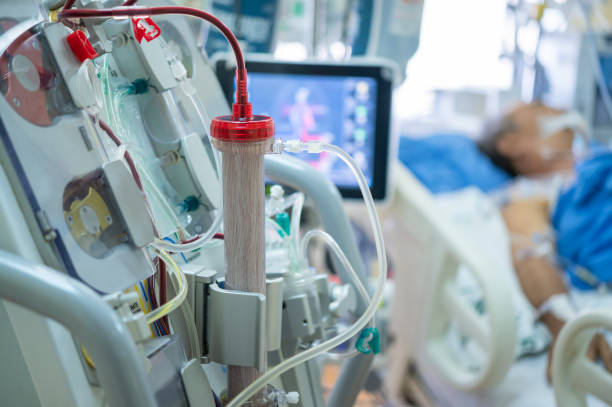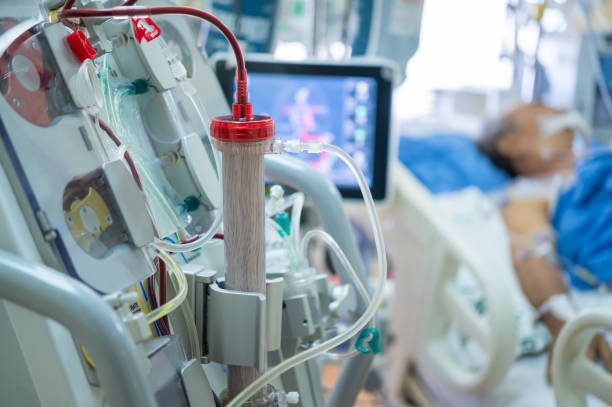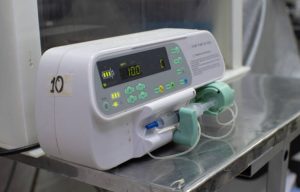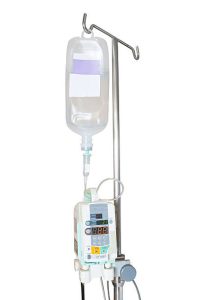
Experts are preparing a dialysis machine for use in critically ill patients in hospital intensive care units.

Table of Contents
Dialysis Machine Overview
A dialysis machine is a medical device used to filter waste products and excess fluids from the blood when the kidneys are unable to perform these functions due to disease or injury. There are two main types of dialysis: hemodialysis and peritoneal dialysis.
Types of Dialysis Machines
- Hemodialysis Machine:
- Used for hemodialysis treatment.
- Filters blood through an artificial kidney (dialyzer) to remove toxins and excess fluids.
- Requires vascular access (usually through a fistula or graft).
- Peritoneal Dialysis Machine:
- Used for peritoneal dialysis treatment.
- Infuses a dialysis solution into the abdominal cavity, allowing the peritoneal membrane to filter waste.
- Can be performed manually or using an automated cycler for overnight treatments.
Popular Brands & Prices
- Fresenius Medical Care 4008S:
- Price: Approximately $25,000 – $30,000
- Features: Advanced filtration technology, user-friendly interface, and real-time monitoring.
- Baxter HomeChoice Pro:
- Price: Around $5,000 – $10,000
- Features: Designed for peritoneal dialysis with automated fluid exchanges, compact design.
- Nipro Surdial:
- Price: Approximately $20,000 – $25,000
- Features: Integrated dialysis and monitoring features, high efficiency in waste removal.
How Dialysis Machine Work
- Blood Circulation: In hemodialysis, blood is drawn from the body and pumped into the dialysis machine.
- Filtration: Blood passes through the dialyzer, where waste products and excess fluids are removed through a semi-permeable membrane.
- Return: Filtered blood is returned to the body, typically in a cycle lasting 3-5 hours, multiple times a week.
- Peritoneal Dialysis: Involves infusing dialysate into the abdominal cavity, allowing waste to diffuse into the fluid, which is then drained.
Features & Specifications
- Monitoring Systems: Real-time monitoring of blood pressure, flow rates, and dialysate concentrations.
- User Interface: Touchscreen controls for easy navigation and adjustments.
- Safety Alarms: Alerts for issues like low blood flow or pressure changes.
- Power Backup: Some models have battery backup for use during power outages.
Performance
- Efficiency: High efficacy in removing toxins and excess fluids from the blood.
- Patient Comfort: Modern machines are designed to minimize discomfort during treatment.
- Customizable Settings: Allows tailoring of treatment parameters to individual patient needs.
Safety Features
- Auto Shutdown: Automatically powers down in case of a malfunction or emergency.
- Regular Calibration: Ensures accuracy in measurements and operations.
- Emergency Protocols: Built-in protocols for handling adverse events.
Pros and Cons
Pros:
- Life-Saving: Essential for patients with kidney failure.
- Flexibility: Can be used in hospital settings or at home (especially for peritoneal dialysis).
- Advanced Technology: Continuous improvements enhance patient outcomes and safety.
Cons:
- Cost: High initial investment and ongoing maintenance costs.
- Time-Consuming: Hemodialysis requires multiple sessions weekly.
- Training Required: Staff and patients need training to operate the machines safely.
User Feedback/Testimonials
- Patients: “The comfort and efficiency of the new machines make my sessions much more bearable.”
- Healthcare Providers: “These machines have advanced significantly, making our job easier and improving patient care.”
- Home Dialysis Users: “Having the machine at home has given me more control over my treatment schedule.”
- Fresenius Medical Care – Offers popular models like the Fresenius 5008S and 5008 CorDiax.
- Baxter International – Known for their AK 98 and Phoenix dialysis machines.
- Nipro – Offers the SURDIAL series, including SURDIAL DX.
- B. Braun – Provides the Dialog+ series of dialysis machines.
- NxStage Medical – Known for their System One portable home dialysis machine.
- Gambro (now part of Baxter) – Offers models like the AK 96 and AK 200.
- Medtronic – Provides advanced dialysis solutions, particularly after acquiring Bellco.
These brands are widely recognized for their quality and innovation in dialysis treatment.
Disclaimer
Dialysis machines should only be operated by trained healthcare professionals or under the guidance of medical personnel. Regular maintenance and monitoring are essential for safe and effective treatment.
This overview provides essential information about dialysis machine, including types, pricing, features, and their importance in treating kidney failure.








